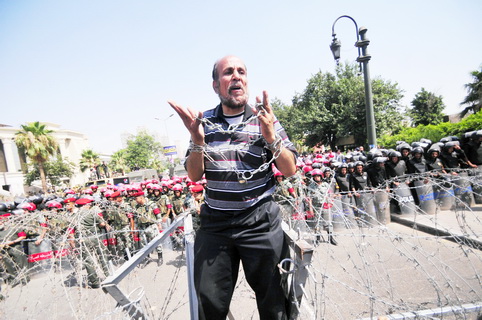
By Mostafa Saleh
An administrative court considered Monday a case filed by several members of the recently dissolved Peoples’ Assembly against the head Justice of the Supreme Constitutional Court in an effort to reverse his decision to dissolve parliament.
The Freedom and Justice party (FJP) established an advocates’ team of legislatives and constitutional experts from the FJP to stand in front of court Monday.
The legal arguments for the team mainly revolve around the unconstitutionality of court’s decision to dissolve parliament, due to the absence of any legal text which gives them the right to do so.
The team is arguing that the court’s decision should have only to the members affiliated to a party that contested seats that were reserved for independent candidates.
It was on the grounds that these members diluted the intention of the seats saved for independent candidates that the assembly was deemed unconstitutional.
As such, the legal team aims to make the case that this decision does not need to apply to the whole people’s assembly.
Meanwhile, hundreds of ex-Peoples’s Assembly representatives – mostly from the FJP and the Noor Salafist party, as well as other political parties – gathered in front of the State Council during the court’s consideration of the suit to protest the dissolution of parliament.
Security forces maximized their presence in front of the Court to prevent any violence.
Elborsa news sources – who wished to remain anonymous – said that an extensive meeting between President Elect Mohammed Morsi, ex-Speaker of the Peoples’ Assembly Saad Al-Katatni and Field Marshal Tantawi, among others will be held within this week in order to seek a resolution to parliament’s paralysis.
One solution being offered, according to the sources, is to hold a popular referendum on dissolving parliament.
One factor driving a swift resolution involves the office of the presidency.
SCAF’s constitutional proclamation – issued in May 2011 – stated that the elected president would swear the oath of his office in front of the elected parliament.
Yet, after the dissolution of parliament SCAF was forced to reverse its position and now states that the elected president should swear the oath in front of the general assembly of the Supreme Constitutional Court.
Egyptian news service, Al-Ahram, reported on Monday that the President would take this option.
Still the situation remains exacerbated by the fact that the President’s oath is to protect the constitution of Egypt.
As Egypt currently still has no constitution, that statement becomes murky.
MENA news agency reported that constitutional expert and former parliamentary representative for the FJP, Sobhi Saleh, announced Monday that president-elect Morsi would swear the oath in front of the Supreme Constitutional Council, without it being taken or interpreted as his acknowledging the dissolution of parliament.

